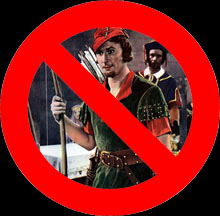I have noted over the years a strong bias against what are now called 'martial' classes in that regard. Heroic warriors of myth and legend frequently performed absolutely impossible feats. Fergus mac Roth punched the peak off a mountain. Everyone of Charlemagne's knights in the Song of Roland was spitting saracens four to a lance and cleaving mounted foes from helm through their horse's spines. But for some reason, we want to 'reality check' anything a fighter might do.
On the other extreme, wizards of myth and legend frequently did very little. Their powers were subtle, mysterious, and not often much use in combat. One of Merlin's greatest feats of spell-casting was to cause the tents of an invading army to collapse - aside from that, he turned into a bird now and then, and created a disguise that fooled a noble's own wife. Circe could transform a man into an animal by serving him a magic potion in a cup of wine. Cool stuff, but it ain't fireballs and lightning bolts and unerring magic missles and Time Stop. But do wizards ever get called on 'verisimilitude?' No, "it's magic" so they can do whatever their powers say, no questions asked.
It's intollerance, is what it is. Virulent anti-martialism.
It's an interesting point you're bringing to the table, and since it is a step further from our previous exchanges, I think it's worth answering to from my point of view.
I'm sure you're going to find plenty of people whose opinions and scrutiny indeed fit this sort of anti-martial bias you're pointing out. Everything's possible for a wizard because well, that's magic, while the fighter will be looked upon with intense "this must be believable" criticism, whatever that means for the people involved.
Now, I do think there's some logic to it in the sense that yes, magic is well, magical, and non-magic moves are subjected to a set of Physics rules we can better understand when talking about a fantasy world with a set of Physics comparable to our world.
YET, I actually agree with your argument, and am myself not opposed to martial classes being able to do amazing moves and exploits in combat. Far from it.
My objections are not targeted at martial classes in particular, and are not concerned with that type of bias you describe. No. What I am specifically rejecting is the narrative logic that sustains some of 4E's mechanics, and/or explaination of such mechanics done in a Skip Williams, "rules in a vacuum", style. I.e. explaining rules with a "narrative" explanation, or rules explained in the context of other rules only, with complete disregard for their application in the game world.
Let me take an example: Daily and Encounter powers in 4E. While I can easily explain in my mind why a Wizard would have Daily powers and Encounter powers, much in the same way I would explain why in older editions they had a limited amount of memory "slots" in a Vancian system, I find no way to explain why Fighters would only be able to use a given Martial move (exploit) only one per Day, or per Encounter. The usual explanation that is given to me for such powers is that "it's a cool move, the kind of move that ends a scene in a movie, or ends the episode". This, is a narrative explanation. It's not connected to the game world, but it's concerned with a bird's eye view upon the characters, which rubs me the wrong way as far as role playing is concerned. It basically breaks my suspension of disbelief and makes me consider game mechanics from an author's, third person, point of view, instead of an in-character, immersed point of view.
One of my favorite OGL games is Iron Heroes. In there, you've got some badass martial classes able to perform all sorts of amazing moves in combat. But the mechanics don't use this sort of narrative logic to balance classes against each other. Instead, you have in most cases the use of pools, with the characters actually performing some specific actions or preparation or moves in the game world to be able to gather "tokens", which they then are able to spend on these amazing moves. This is an in-game explanation that does not affect my suspension of disbelief, personally.
Thing is, there would be ways in which 4E could get away from this narrative logic I do not appreciate. One could for instance state that characters may use Encounter and Daily powers freely once per either encounter or day, and then would be able to use these same powers additionally for a specific price that would kick in after their first free use. Performing this amazing move more than once to cause a character to become fatigued, for instance, or using that particular trip more than once would cause the enemy to gain modifiers on defence, or that particular spells cast again would cause the character to potentially become mad, or whatever.
What I'm saying is that there ways, relatively easy ways, to add to the 4E experience so that the narrative logic doesn't have to be the single overwhelming logic that sustains the whole system, while still keeping the cool exploits, prayers, spells and what-have-you just as efficient as they previously were, if not more effective than they were. It's all a question of fine tuning, to me. A question of opening the system to different types of role playing, rather than nerfing anything even more than it was with the changes of editions.
Hope that makes my POV clearer.



